
There was a new display of unity in Derry on Sunday as different campaigns aligned to call for justice for the families of the peaceful protesters killed by British soldiers on Bloody Sunday.
As thousands marked the 50th anniversary of one of the defining days of the conflict, plans for an amnesty to include the perpetrators were universally rejected by Ireland’s political establishment, including 26 County Taoiseach, Micheal Martin.
Relatives holding white roses and photographs of those killed led the morning remembrance walk in front of thousands of people to the Bloody Sunday memorial, retracing of the route of the 1972 march.
Among those who attended and who laid wreaths were: Taoiseach Micheál Martin; Sinn Féin president Mary Lou McDonald; SDLP leader Colum Eastwood; and Alliance deputy leader Stephen Farry.
Significantly, no one from the British government attended the commemorations, and unionist politicians also stayed away.
The Taoiseach said it “would have been helpful” had representatives attended. He said the Dublin government supported the Bloody Sunday families “in their pursuit of justice and accountability” and said the soldiers responsible should face prosecution.
“I don’t believe there should be any amnesties for anybody and I believe that the full process of the courts and of justice should be deployed.”
The Irish Foreign Minister, Fine Gael’s Simon Coveney, who also laid a wreath, said “there should be a route to justice”.
“As somebody said, our children were buried 50 years ago but we still haven’t laid them to rest ... because we don’t have justice.”
Mr Coveney reiterated the Dublin government’s opposition to a proposal by British Prime Minister Boris Johnson to being forward an amnesty to try to “draw a line under the troubles”.
“We absolutely cannot and will not support that approach,” said Mr Coveney.
It is a plan that has been rejected by every political party in Ireland. But even before it emerged, it became clear that the only British soldier charged with murder would not face trial, a decision that is being challenged by relatives.
Families of those killed on Bloody Sunday have said there must be justice for their loved ones and they will “meet head on” London plans to introduce a statute of limitations.
Mickey McKinney, whose brother William was shot dead, delivered a statement on behalf of the families at the service at the memorial in the Bogside in Derry on Sunday morning.
“They are trying to deny us justice because they are scared to face justice,” he said.
“We will not go away and we will not be silenced.”
Mr McKinney was on the march on January 30th, 1972, and on Sunday wore the black and white oakleaf badge on his lapel that is the symbol of the civil rights movement.
“Even the weather is the same,” he said later. “When the Paras came in all hell broke loose. What I remember most is the whistling of the bullets as they came spinning past you. We ran like the blazes.”
He had been talking to Jackie Duddy in Chamberlain Street. “We split up... 40 minutes later he was shot dead.” Jackie’s photograph was carried with others at the head of the march as it set off towards the Bogside.
In a virtual address on Sunday afternoon, President Michael D Higgins paid tribute to the victims of Bloody Sunday and all those who died in the conflict, as well as the example set by the people of Derry and those who campaigned for truth.
Former Labour Party leader Jeremy Corbyn was also in the city to deliver the annual Bloody Sunday lecture. He said that despite the findings of the original cover-up being overturned in 2010, there were still concerns.
“There are obviously still issues about the [British] army’s role and, above all, the command structure,” he said.
While the Saville Inquiry was a “huge step forward”, Mr Corbyn said that was not the end of the Bloody Sunday story.
“Any inquiries have got to work out where the orders came from and where the atmosphere for those orders came from; that means you’ve got to go all the way through.
“Where did the authority come from? Why were those soldiers stationed where they were? Why were they so heavily armed for what was, after all, a peaceful demonstration going through the streets of Derry on that day.
“I think those are questions that still need to be answered,” he said.
Mr Corbyn also paid tribute to the Bloody Sunday relatives and other campaigners and said that they and the city of Derry were an inspiration to all those who fought for justice.
He said it was an “outrage” that nobody has been prosecuted for the deaths on Bloody Sunday and it was a “double outrage that the British government is now planning legislation to make it harder for such an effort to succeed at any time in the future.”
The forthcoming amnesty Bill, he said, “would shut down all further inquiries into the state’s actions during the Troubles. Such a law ... would have prohibited the Saville Inquiry,” he said.
![[Irish Republican News]](https://republican-news.org/graphics/title_gifs/rn.gif)
![[Irish Republican News]](https://republican-news.org/graphics/title_gifs/harp.gif)

